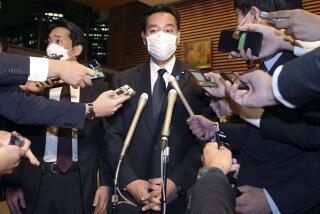THE MEDIA : Breaking the Rules of the ‘Kisha Club’ : Cozy relations between Japan’s press and politicians often leave the public in the cold. But that may be changing.
- Share via
TOKYO — Once again, a top Japanese official declared that the nation’s brutal colonial rule of Korea did some good, and once again he was skewered for it.
The difference is, this official, Takami Eto, head of Japan’s Management and Coordination Agency, made his remarks off the record.
The ensuing fiasco had threatened to derail a weekend summit between Japanese Prime Minister Tomiichi Murayama and South Korean President Kim Young Sam, and resulted in Eto’s resignation this week.
But it has also unleashed a vigorous debate among Japan’s media about whether the press has a public duty to break off-the-record rules to report controversial comments by politicians.
The press has long been regarded as a lap dog to Japan’s ruling elite, and some see the Eto imbroglio as an encouraging sign of greater independence.
The uproar does not herald the imminent collapse of the Japanese “kisha club” system--which maintains the cozy relations between politicians and journalists by limiting access to briefings to approved members. But it has provoked some soul-searching here about the media’s role in informing the public as news organizations debate why a Korean newspaper, not a Japanese one, broke the Eto story.
Eto made his offending remarks off the record more than a month ago at a news conference in Tokyo. A Japanese journalist present anonymously sent the comments to a Korean newspaper. Sentaku, a Japanese magazine, published them in late October, attributing them only to “a Cabinet minister,” and last week Dong-A Ilbo, a Korean paper, broke the full story.
Only after widespread public pressure mounted to provide transcripts of the Oct. 11 interview did two major newspapers, the Tokyo Shimbun and the Mainichi Shimbun, publish their off-the-record materials. Meanwhile, the Yomiuri Shimbun and the Sankei Shimbun defended their decision to abide by the off-the-record rules, reporting on Eto’s comments by quoting Dong-A Ilbo.
“The newspapers aren’t really interested in off the record or the people’s right to know,” said Yasuhiro Tase, author of “Sin and Punishment of Political Journalism,” a scathing criticism of political journalists here.
In Japan, where the mass media have long served as mouthpieces of the Establishment, journalists follow politicians in packs from dawn to dusk; they sit in their offices during the day, drink sake with them in the evenings and camp outside their homes until the wee hours.
“Politicians are in a position to control all information,” Tase said. “Journalists have to ask politicians if they can write things.”
Tatou Takahama, a longtime political journalist at Yomiuri Shimbun, said the faction of the late Prime Minister Kakuei Tanaka--king of the ruling Liberal Democratic Party during the 1970s--was notorious for its tight control of journalists.
“If you wanted to write something they didn’t want you to, they would threaten,” Takahama said. “Then, if you printed it anyway, they wouldn’t acknowledge it, and they would get your newspaper to fire you or send you off to some isolated posting, like Hokkaido.”
In the traditional environment of Japan’s Capitol Hill, the distinction between on and off the record rarely becomes an issue, journalists say, because of self-censorship.
In the United States, the terms are clearly defined: Statements made “off the record” simply may not be used. But here the rules are ambiguous. As a result, the Eto case has divided the Japanese public.
“This has been a year of anger for the Japanese people,” said Karel Von Wolferen, a Dutch journalist who has lived in Japan for more than 20 years. Fed up with a year of government mismanagement--of the Kobe quake-relief efforts, the plodding investigation into the Aum Supreme Truth cult and the Daiwa banking scandal--the Japanese, he said, are demanding more accountability from their institutions.
“The needs of the people are changing,” said Tase. “So the media has to change. We aren’t there yet--but the people are demanding more information.”
More to Read
Sign up for Essential California
The most important California stories and recommendations in your inbox every morning.
You may occasionally receive promotional content from the Los Angeles Times.













